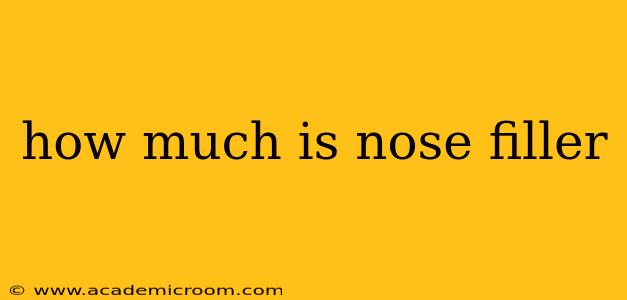The cost of nose filler varies significantly depending on several factors. Understanding these factors will help you budget effectively and make informed decisions about your procedure. This guide breaks down the pricing, influencing variables, and crucial considerations to help you navigate the world of non-surgical rhinoplasty.
What Factors Influence the Cost of Nose Filler?
Several factors contribute to the overall cost of a nose filler treatment. These include:
- Location: Prices vary considerably by geographic location. Metropolitan areas with a higher cost of living generally have higher prices for cosmetic procedures.
- Practitioner Experience: Experienced and highly-regarded injectors command higher fees due to their expertise and established reputation. A board-certified dermatologist or plastic surgeon will likely charge more than a less experienced provider.
- Amount of Filler Used: The volume of filler needed to achieve your desired results directly impacts the final cost. Larger noses or more significant corrections will require more filler, increasing the expense.
- Type of Filler: Different filler brands and types (e.g., hyaluronic acid, calcium hydroxylapatite) have varying price points. Premium brands often come with a higher price tag.
- Clinic Fees: The administrative fees and overhead costs of the clinic also factor into the total cost.
How Much Does Nose Filler Typically Cost in the US?
While providing an exact figure is impossible due to the variability mentioned above, a reasonable range for nose filler in the United States is $500 to $1500 or more per treatment. It's crucial to remember this is a broad estimate. You'll need to contact clinics directly for accurate quotes.
What are the Additional Costs Associated with Nose Filler?
Beyond the initial filler cost, consider these potential additional expenses:
- Follow-up appointments: Some injectors include follow-up appointments in their initial pricing, while others may charge separately.
- Dissolution: If you are unhappy with the results, you might need a filler dissolving agent, adding to the overall cost.
- Travel and accommodation: If you need to travel to a specific clinic, factor in travel and accommodation expenses.
Does Insurance Cover Nose Filler?
Generally, nose filler is considered a cosmetic procedure and is not covered by insurance. Insurance typically only covers medically necessary procedures, and nose filler is usually deemed elective.
What Questions Should I Ask Before Getting Nose Filler?
Before committing to nose filler, it's essential to ask the following questions:
- What type of filler will be used, and why? Understanding the type of filler is crucial for managing expectations and potential risks.
- What are the potential side effects? Discuss potential risks, such as bruising, swelling, and infection.
- What is the injector's experience with nose filler? Confirm their credentials and experience.
- What is the total cost, including any potential additional charges? Ensure transparent pricing.
- What is the clinic's refund policy? Understand the clinic's policy in case you're dissatisfied with the results.
- Can I see before-and-after photos of the injector's work? This helps you gauge their skills and the potential results.
Conclusion: Making Informed Decisions about Nose Filler
Understanding the factors affecting the cost of nose filler and asking the right questions empowers you to make informed choices. Remember, prioritizing safety, experience, and transparency is crucial when choosing an injector and clinic. Always conduct thorough research and consult with multiple professionals to find the best fit for your needs and budget. Don't hesitate to seek second opinions before undergoing the procedure. Your health and satisfaction are paramount.
